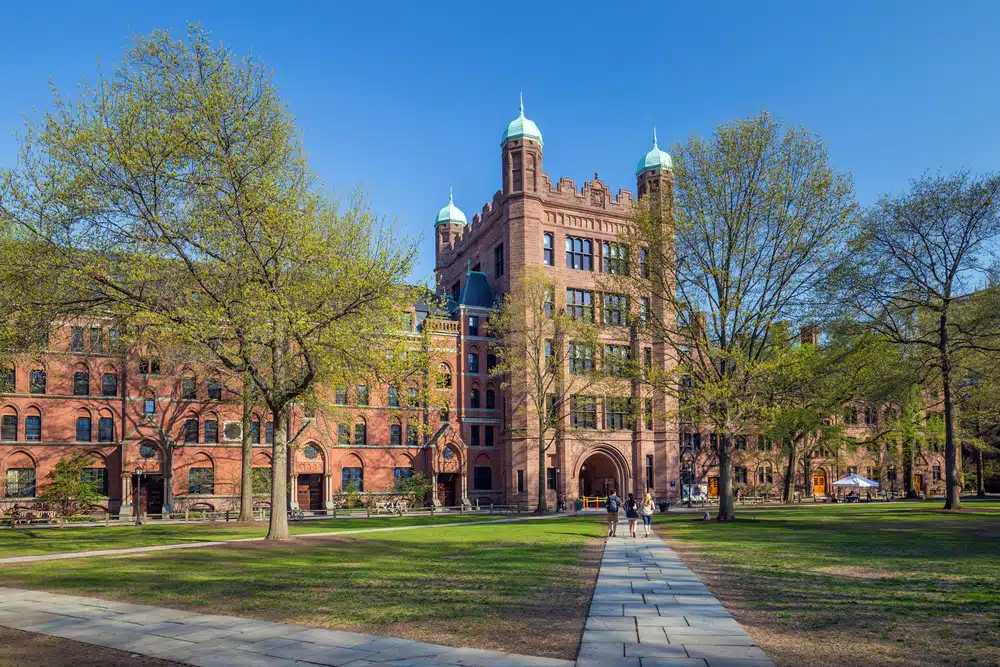Does Yale Have Early Action?
If you’re considering applying to Yale University, you may be wondering if they offer an Early Action program. In this article, we will explore Yale’s Early Action policies, the benefits of applying early, and how to navigate the application process. Let’s dive in and find out more.
Understanding Early Action
Before we delve into Yale’s specific policies, it’s important to understand what Early Action means in the college admissions context. Early Action is a non-binding application option that allows students to submit their materials earlier than the regular deadline. Participating in Early Action typically enables students to receive admissions decisions earlier, giving them more time to consider their options and plan for the future.
Definition of Early Action
In the case of Yale University, Early Action means that applicants can submit their materials earlier than the regular decision deadline, typically in November. This Early Action option is non-binding, meaning that if a student is accepted, they are not obligated to enroll and can still consider offers from other institutions.
Early Action at Yale provides students with a unique opportunity to showcase their academic achievements, extracurricular involvement, and personal qualities to the admissions committee. By submitting their application materials early, students can take advantage of the extended evaluation period that Yale offers, allowing for a thorough and comprehensive review of their application.
Yale’s Early Action program is designed to give students the chance to demonstrate their enthusiasm for the university and their commitment to pursuing higher education. The admissions committee recognizes that applying early requires students to prioritize Yale and can help highlight their dedication to the institution.
Benefits of Early Action
There are several advantages to applying to Yale through the Early Action program. Firstly, it allows students to receive their admission decision earlier, typically by mid-December. This early notification can alleviate some of the stress associated with college applications and give students more time to plan their next steps.
Moreover, applying Early Action can provide students with a sense of relief and reassurance. By submitting their application early, students can avoid the anxiety and uncertainty that often comes with waiting for college decisions. Instead, they can focus on their academic pursuits and make informed decisions about their future.
Additionally, if a student is admitted through Early Action, they have the benefit of knowing their college plans well in advance. This can be especially helpful for students who wish to apply for financial aid or need more time to explore housing options or other logistics. It allows them to plan and prepare for their transition to college with greater ease and peace of mind.
Furthermore, being accepted through Early Action can provide students with a sense of accomplishment and validation. It serves as recognition of their hard work, achievements, and potential. This early acceptance can boost their confidence and motivate them to continue excelling academically and personally.
In conclusion, Yale’s Early Action program offers students the opportunity to showcase their strengths, demonstrate their commitment to the university, and receive an early admission decision. By applying Early Action, students can alleviate stress, plan for the future, and gain a sense of reassurance and accomplishment. It is a valuable option for those who are eager to embark on their college journey at Yale University.
Yale’s Admission Policies
Now that we have a general understanding of Early Action, let’s explore Yale’s admission policies and how they approach early applications.
Overview of Yale’s Admission Process
Yale University follows a holistic admissions process, considering not only a student’s academic achievements but also their personal qualities, extracurricular involvement, and potential contributions to the campus community. The admissions committee reviews applications thoroughly, taking into account a range of factors to create a diverse and well-rounded incoming class.
When evaluating academic achievements, Yale looks beyond just grades and test scores. They consider the rigor of the applicant’s high school curriculum, the competitiveness of their school, and any challenges they may have faced in their educational journey. This allows Yale to assess an applicant’s academic potential in a more comprehensive manner.
In addition to academic achievements, Yale places great emphasis on an applicant’s personal qualities. They are interested in understanding the applicant’s character, values, and motivations. This is why personal essays and letters of recommendation play a crucial role in the admission process. These components provide insights into an applicant’s unique experiences, perspectives, and aspirations.
Extracurricular involvement is another important aspect that Yale considers. They value students who have demonstrated leadership, initiative, and a commitment to their passions outside of the classroom. Whether it’s participating in sports, engaging in community service, or pursuing artistic endeavors, Yale believes that these experiences contribute to a well-rounded education and help shape future leaders.
Yale is committed to providing equal opportunities to all applicants and practices need-blind admissions, meaning that a student’s financial circumstances do not impact their chances of admission. This ensures that all students, regardless of their financial situation, have an equal shot at attending Yale. The university is dedicated to creating a diverse and inclusive community where students from all backgrounds can thrive and contribute.
Yale’s Stance on Early Action
Yale University offers a single Early Action deadline for prospective students. This means that if you choose to apply early, you must submit your application by the specified deadline, typically in mid-November.
It’s important to note that Yale does not offer an Early Decision option. Early Decision is a binding application process where students commit to attending the institution if accepted. Since Yale wants students to have the freedom to explore their options, they have opted for an Early Action program instead.
Yale’s Early Action program allows students to apply to other colleges and universities simultaneously. This flexibility gives applicants the opportunity to compare offers of admission and financial aid packages before making a final decision. It aligns with Yale’s commitment to supporting students in making informed choices about their higher education journey.
When reviewing Early Action applications, Yale takes into consideration the same holistic criteria as they do for regular decision applicants. There is no advantage or disadvantage to applying early, and all applications are evaluated with the same level of care and attention to detail.
Yale’s Early Action program is highly competitive, with a large number of qualified applicants vying for a limited number of spots. However, applying early does demonstrate a student’s strong interest in Yale and can be advantageous in the admission process. It shows the admissions committee that the student has thoroughly researched the university and believes it is a good fit for their academic and personal goals.
In conclusion, Yale’s admission policies prioritize a holistic evaluation of applicants, considering their academic achievements, personal qualities, extracurricular involvement, and potential contributions to the campus community. The university is committed to providing equal opportunities to all students and practices need-blind admissions. With regard to early applications, Yale offers an Early Action program that allows students to apply to other institutions simultaneously, emphasizing the importance of informed decision-making.
Comparing Early Action and Regular Decision at Yale
Now that we understand Yale’s Early Action program, let’s consider the differences between applying early and applying through the regular decision process.
When it comes to the timeline for receiving admissions decisions, there is a significant difference between Early Action and regular decisions. Early Action applicants typically hear back from Yale by mid-December, which means they can start planning their future earlier. On the other hand, regular decision applicants have to wait until the spring to receive their decisions, which can be a bit more nerve-wracking.
Another important distinction between Early Action and regular decision is the binding nature of the application. Early Action is non-binding, meaning that if a student is accepted, they are not obligated to enroll. This gives students more flexibility and allows them to consider other options. In contrast, regular decision applicants can choose from the offers they receive and make a final decision by the enrollment deadline. This binding nature can add a level of commitment and certainty to the process.
Pros and Cons of Applying Early Action at Yale
There are pros and cons to consider when deciding whether to apply Early Action to Yale. Some advantages of Early Action include the benefit of knowing your admissions decision earlier, which can provide a sense of relief and allow for better planning. This early knowledge can also help students focus their efforts on other applications or scholarship opportunities.
Additionally, if you are admitted through Early Action, you have more time to learn about Yale and its programs before making your final decision. This extra time can be valuable in understanding whether Yale is the right fit for you academically, socially, and personally. It gives you the opportunity to visit the campus, attend information sessions, and connect with current students or alumni.
On the other hand, some students may prefer to submit their applications through the regular decision process. This allows for a longer timeframe to prepare applications and gather necessary materials. Regular decision applicants also have more time to explore other college options before making their final decision. This can be particularly helpful for students who are still uncertain about their top choices or who want to compare financial aid packages.
Ultimately, the decision between Early Action and regular decision should be based on your individual circumstances, preferences, and goals. It’s important to carefully consider the pros and cons of each option and weigh them against your own priorities. Remember, both Early Action and regular decision applicants have the opportunity to be admitted to Yale, so choose the path that aligns best with your needs and aspirations.
How to Apply for Early Action at Yale
Now that we have discussed the benefits of Early Action and compared it to regular decisions, it’s essential to understand the process of applying for Early Action at Yale.
Applying for Early Action at Yale is an exciting opportunity for students who are eager to secure their spot at one of the most prestigious universities in the world. The application process is straightforward, but it requires careful attention to detail and thorough preparation.
Application Requirements for Early Action
To apply to Yale through Early Action, you must submit the Common Application or Coalition Application, along with the necessary supporting documents. These documents typically include high school transcripts, standardized test scores (SAT or ACT), letters of recommendation, and a personal statement or essay.
High school transcripts provide Yale’s admissions committee with a comprehensive overview of your academic performance throughout your high school years. They showcase your ability to excel in various subjects and give insight into your commitment to learning.
Standardized test scores, such as the SAT or ACT, play a crucial role in the admissions process. They provide a standardized measure of your academic abilities and help the admissions committee assess your potential for success at Yale.
Letters of recommendation are an essential component of your Early Action application. They provide valuable insights into your character, work ethic, and potential as a student. It is important to choose recommenders who know you well and can speak to your strengths and accomplishments.
The personal statement or essay is your opportunity to showcase your unique voice and perspective. It allows you to share your personal story, experiences, and aspirations with the admissions committee. Take the time to craft a compelling and authentic essay that reflects your true self.
It’s crucial to carefully review the application requirements on Yale’s official website to ensure that you submit all the necessary materials before the Early Action deadline. Missing any required documents can jeopardize your chances of being considered for admission.
Timeline for Early Action Application at Yale
The Early Action application deadline at Yale is typically in mid-November. It is vital to mark this date on your calendar and give yourself plenty of time to gather all the required materials and complete your application.
Once you have submitted your Early Action application, the anticipation begins. Waiting for an admissions decision can be nerve-wracking, but it is also an exciting time filled with possibilities. While waiting, it’s important to stay focused on your academic responsibilities and continue to pursue your passions.
After submitting your Early Action application, you can expect to receive an admissions decision from Yale by mid-December. Be prepared to check your email regularly during that time as that is how Yale communicates admissions decisions to applicants.
Receiving an acceptance letter from Yale is a momentous occasion that can change the trajectory of your academic and professional future. It is a testament to your hard work, dedication, and potential. If you are admitted to Yale through Early Action, congratulations! Your journey as a Yale student is about to begin.
However, if you receive a deferral or rejection, remember that it is not the end of the world. Many successful individuals have faced setbacks in their academic journey and have gone on to achieve great things. Take the time to reflect on your goals and consider alternative paths to achieve them. Keep in mind that there are many excellent universities and opportunities available, and your determination and resilience will lead you to success.
What Happens After Applying Early Action at Yale
After submitting your Early Action application and receiving your admissions decision from Yale, there are several steps to take to navigate the next phase of the college admissions process.
Once Yale makes their Early Action decisions in mid-December, they notify applicants via email. It’s essential to carefully read the contents of the email, as it will outline the specifics of their decision and any necessary steps to be taken next.
For those who are accepted through Early Action, congratulations! This is a significant achievement and a testament to your hard work and dedication. You have the option to accept or decline Yale’s offer. Be sure to thoroughly review any instructions or deadlines provided in your acceptance package. Take the time to celebrate your accomplishments and consider the opportunities that await you at Yale.
Additionally, it may be beneficial to reach out to Yale’s admissions office with any questions you may have or to seek further clarification on the acceptance process. The admissions team is there to support and guide you through this exciting time, so don’t hesitate to take advantage of their expertise.
For those who are deferred or waitlisted, it’s important to understand what these decisions mean. Deferred means that the admissions committee will reconsider your application later in the regular decision round, giving you another chance to be admitted. While it may feel disappointing not to receive an immediate acceptance, being deferred still indicates that the admissions committee sees potential in your application. Take this as an opportunity to reflect on your strengths and consider any additional information or updates you may want to provide to Yale.
Waitlisted means that Yale is holding your application and will evaluate it further if spots become available in the incoming class. While being waitlisted can be uncertain and sometimes frustrating, it’s important to stay positive and keep your options open. Many students who were initially waitlisted have gone on to be accepted, so don’t lose hope. Consider reaching out to Yale to express your continued interest and update them on any significant achievements or developments since submitting your application.
If you receive a rejection letter, know that it doesn’t determine your worth or potential for success. Remember that many students are qualified applicants, and the admissions process is highly competitive. It’s natural to feel disappointed but try not to dwell on it for too long. Take this as an opportunity to explore other institutions that may be a good fit for your academic and personal goals. There are numerous colleges and universities that offer exceptional education and opportunities, so don’t limit yourself to just one option.
Ultimately, the college admissions process is a journey filled with ups and downs. Regardless of the outcome, it’s important to stay focused on your goals and aspirations. Keep working hard, stay true to yourself, and trust that the right path will unfold. Remember, the college you attend is just one part of your educational journey, and success can be achieved in many different ways. Embrace the opportunities that come your way and make the most of your college experience, wherever it may be.
Wrapping Up
In conclusion, Yale University offers an Early Action program that allows students to apply earlier than the regular decision deadline. Applying Early Action has several benefits, including receiving admissions decisions earlier and demonstrating a strong interest in the university.
If you decide to apply Early Action to Yale, be sure to carefully review the application requirements and submit all necessary documents before the deadline. After applying, keep an eye out for the admissions decision in mid-December, and be prepared to take the appropriate steps based on the outcome.
Remember, whether you apply Early Action or through regular decisions, Yale is looking for well-rounded individuals who can contribute to their unique academic community. So put your best foot forward, and good luck with your application!











































